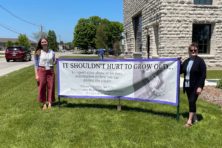Coordinated Community Response: CCR’s Focus on Elder Abuse
- Share
- Tweet
- Pin
- Share
My personal adventure in elderdom began last year. It coincided with some pretty intensive training about elder abuse that I and several other Coordinated Community Response (CCR) partners received from the fine folks at the Department of Justice and the National Clearinghouse for Abuse in Later Life.
Each of us CCR partners works with people in crisis. We work in law enforcement, the criminal justice system, one of several areas within the Door County Department of Social Services, emergency services, public and private health care, education, and private businesses of many kinds.
CCR’s Elder Team focuses on elder abuse. Our mission is to increase awareness of abuse and neglect of older adults through community education, training, coordination and response while working collaboratively to create an accessible system that promotes victim safety and offender accountability.
Given Door County’s aging population, elder abuse is likely to become a more important part of the work we all do. Consider this: In the 2000 census for Door County, 20.2% of our population was older than 65. That’s slightly more than one-fifth. In 2010, it jumped to 24.3%, or nearly one-fourth. In 2019, it went up to 29%, getting close to one-third.
Just what, exactly, is elder abuse? It is domestic abuse targeted at elders that comes in the form of physical and/or sexual attacks or impropriety, financial misdeeds, and emotional and psychological harm. Some vulnerabilities increase as we age that can make us an easier target: We likely have reduced physical strength and may depend on others for some help with daily living. We may have more resources, own a home and other valuable things, and have savings and investments.
Who does that kind of thing to an elder? Most often, it’s someone they know well and trust: a caregiver, a family member, a neighbor.
Why would anyone do that? Gosh, there are so many reasons. Abusers think they’re entitled. They feel more powerful when they hurt someone. They need the money. They’re getting revenge.
How can people tell whether something weird is going on with an elder they know? There are a lot of red flags, and many could be indicators of things that have nothing to do with abuse. Most importantly, however, the individual is just not her or his usual self. Your elder friend doesn’t go to church or join the gang for coffee anymore. There are unexplained bruises or bandages. The individual is reluctant to talk, or your friend talks a lot about a new significant other. Valuable things go missing from the home.
What can a friend do to help? The first thing is to let the individual know that you see him or her because people who are being abused often feel invisible. If the abuser is a trusted person, the elder may feel ashamed or embarrassed and probably does not want the abuser to get in trouble – she or he just wants the abuse to stop.
Do what you can to connect or reconnect your elder friend to cherished activities and interests. And finally, offer to accompany your elder friend to one of Door County’s many helping agencies. We all work together, so even if the agency you choose isn’t the perfect place for your friend’s issues, its staff will know which one is.
This article is brought to you in part by the Door County Coordinated Community Response (CCR) to Domestic Violence and Sexual Assault Teams and the Door County Elder and Adult-at-Risk Interdisciplinary Team.

